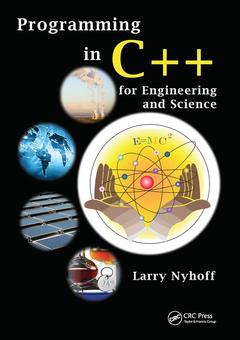Description
Programming in C++ for Engineering and Science
Author: Nyhoff Larry
Language: English
Subjects for Programming in C++ for Engineering and Science:
Keywords
Namespace Std; Wind Chill Index; Programming in C++; IP Address; STL; object-centered design; Curly Braces; file processing; Int Count; Data Structures; Celsius Temperature; multidimensional arrays; Boolean Expressions; vector class template; AQI; Standard Template Library; Data Members; Software Engineering; Stored Program Concept; programs to solve engineering and science problems; Header Le; Control Structures; Member Functions; C++ classes; Pollution Readings; Building Classes; Smart Phone; Vice Versa; Binary Search; Int Sum; String Object; LEWIS CARROLL; White Space; Array Declaration; SAMPLE RUNS; Anchor Case; Linear System
Publication date: 09-2018
· 17.8x25.4 cm · Hardback
Publication date: 09-2012
728 p. · 17.8x25.4 cm · Paperback
Description
/li>Contents
/li>Readership
/li>Biography
/li>
Developed from the author?s many years of teaching computing courses, Programming in C++ for Engineering and Science guides students in designing programs to solve real problems encountered in engineering and scientific applications. These problems include radioactive decay, pollution indexes, digital circuits, differential equations, Internet addresses, data analysis, simulation, quality control, electrical networks, data encryption, beam deflection, and many other areas.
To make it easier for novices to develop programs, the author uses an object-centered design approach that helps students identify the objects in a problem and the operations needed; develop an algorithm for processing; implement the objects, operations, and algorithm in a program; and test, correct, and revise the program. He also revisits topics in greater detail as the text progresses. By the end of the book, students will have a solid understanding of how C++ can be used to process complex objects, including how classes can be built to model objects.
Web ResourceThe book?s website at http://cs.calvin.edu/books/c++/engr-sci provides source code, expanded presentations, links to relevant sites, reference materials, lab exercises, and projects. For instructors, solutions to exercises and PowerPoint slides for classroom use are available upon qualifying course adoption.
Introduction to Computing. Programming and Problem Solving—Software Engineering. Types in C++. Getting Started with Expressions. Control Structures. Functions and Libraries. Using Classes. More Selection Control Structures. More Repetition Control Structures. Functions in Depth. Files and Streams. Arrays and the vector Class Template. Multidimensional Arrays and Vectors. Building Classes. Pointers and Linked Structures. Data Structures. Answers to Test Yourself Questions. Appendices.
Larry Nyhoff is a professor emeritus at Calvin College, where he continues to teach part-time. He retired in 2003 after 41 years of teaching mathematics and computing. Upon retirement, Professor Nyhoff was awarded the College’s highest faculty honor, the Presidential Award for Exemplary Teaching. He earned a PhD from Michigan State University, has co-authored more than 25 textbooks on programming in Fortran, Turbo Pascal, Modula-2, Java, and C++, and has authored several textbooks on introductory data structures.
These books may interest you

Starting Out with C++ Early Objects 160.78 €



